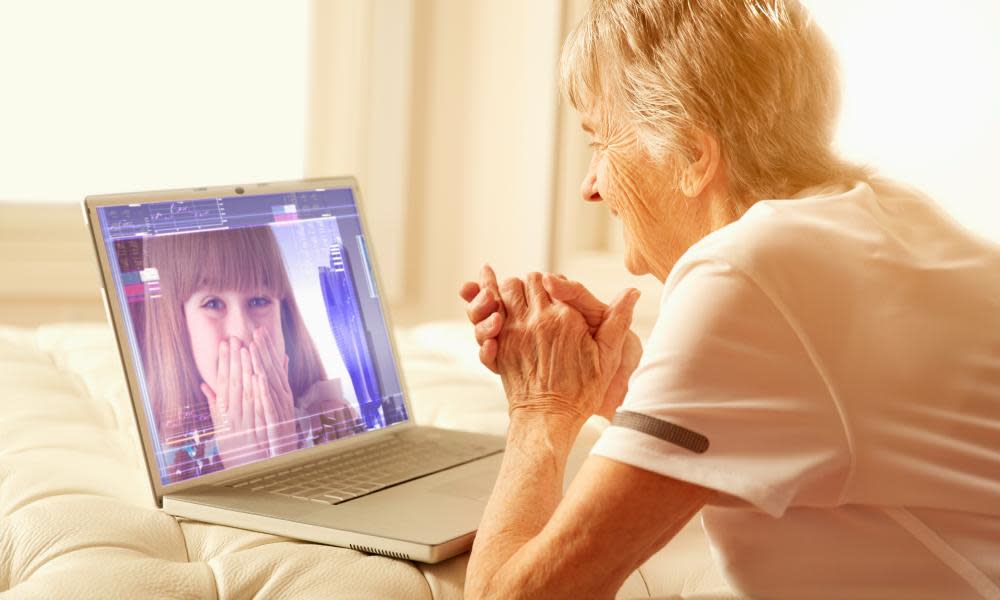Grandparenting from a distance: how coronavirus challenges the closest bonds

There’s only been one breach of the new security protocol at Susan and John Slaughter’s home in the Brisbane suburb of Lutwyche.
“Harry, who’s four, popped his head over the stable door in the kitchen,” says his grandmother Susan, 74. “He had a cheeky grin and he knew he was being naughty.”
She’s making light of one of the crueller inconveniences – and starker truths – of the new Covid-19 stasis: safety means separation, especially for older people. Australia’s mortality rate from coronavirus is thankfully one of the lowest in the world so far, but most of the deaths have been people aged 70 and over. Globally, the mortality rate is highest for the 80-plus age group, which now stands above 10%. Children, meanwhile, seem less susceptible to the worst effects but carry the risk of infecting others.
Related: Grace Dent: 'My mother, in her 80s, is being guarded like a rare Fabergé egg'
For the grandmother of four and her husband, an 80-year-old psychiatrist, that means a strict new diktat: grandparenting from a distance. With their grandchildren living over the garden fence and their daily lives deeply entwined, familial distancing is no small undertaking.
“The last time we had any physical contact was the 14th of March,” Susan says. “All my time was geared around the children but it’s all changed. They’re not allowed into the house any more and so we see them over the fence and on FaceTime.
“I understand it but it’s hard. It goes against all our ideas of togetherness and contact and the bonds that you make with children. I keep thinking, ‘Why aren’t they here?’”
Susan’s daughter Lizzie is getting used to a new daily juggle of work, childcare and family life without the parental support she and her partner relied upon.
“The hardest thing is that, because we are working, we don’t have the option of taking our children out of school and daycare without the normal help from my parents,” says the medical device specialist, 42. “But letting them spend time together is not worth the risk.”
By erring on the side of caution, they are among the growing number of families without underlying illnesses who pre-empted, and went further than, the warnings of the likes of the Queensland premier Annastacia Palaszczuk, who this week told parents: “If you have a grandparent who is unwell, who has one of those chronic conditions, you must not take your children to visit those grandparents. These are very clear messages.”
How would you feel if your children gave your parents the virus and then they got desperately sick or died?
David Isaacs
Prof Linda Selvey, infectious diseases epidemiologist with the school of public health at the University of Queensland, acknowledges that with evidence about the disease constantly emerging, the best course of action can, in fact, feel less than clear.
“Are children at greater risk of transmitting the infection than anybody else? Probably not,” Selvey says. But, as she points out, they are less likely to wash their hands properly and they want more physical contact than others, both factors in Covid-19’s spread. She adds that it’s important to include elderly people in decision-making processes around family distancing.
For grandfather and clinical professor in paediatric infectious diseases at the University of Sydney, David Isaacs, older people need our protection, no matter the age group they are exposed to.
“What evidence there is suggests that older people give it to children, if anything,” he says. “It then spreads within family groups.”
But children are often mildly infected or asymptomatic, and we don’t yet know how likely an asymptomatic person is to spread the disease. Because of that possibility of exposure to the virus, no matter how minimal, Isaacs is unambiguous.
“The actual risk that the children will give it to [grandparents] is probably not that high, but how would you feel if your children gave your parents the virus and then they got desperately sick or died?”
The question, then, becomes how to enforce separation without plunging vulnerable people into a contact void.
Isaacs – whose children have barred visits from his toddler grandson – stresses that this is no time to step away from interaction with elderly people. Now, more than ever, is a time for support – and physical distancing, not social isolation, is key to the health of our older population. Complete separation comes with its own set of complications, their importance often drowned out by the din around the immediate dangers of the virus.
Related: Skype lessons and exercise plans: how older people are preparing for lockdown
Scientia Prof Henry Brodaty, co-director of UNSW’s Centre for Healthy Brain Ageing, is physically distancing himself from his own grandchildren yet warns that, for some elderly people, the dangers of not seeing their grandchildren might outweigh the alternative.
“One of my patients is very isolated and she’s depressed and she’s bereaved and really the one light in her week is her visit from her grandchildren,” he says.
For now, though, the official word remains. This virus kills. Stay at home, stay apart where necessary – but, also, make sure to stay in touch. And so the new normal for family generations living close is love at a sensible distance.
“It’s certainly made a difference to the house, it’s much tidier and quieter, but I do hear the occasional pierced scream and laughter from next door,” Susan says.
“I’m finding it hard but it’s still new. I don’t think I’ve come to terms with the fact that this isn’t short term – it’s strange to think that there’s a big expanse of time ahead and you don’t know what’s going to happen.” She pauses: “No one really knows.”


